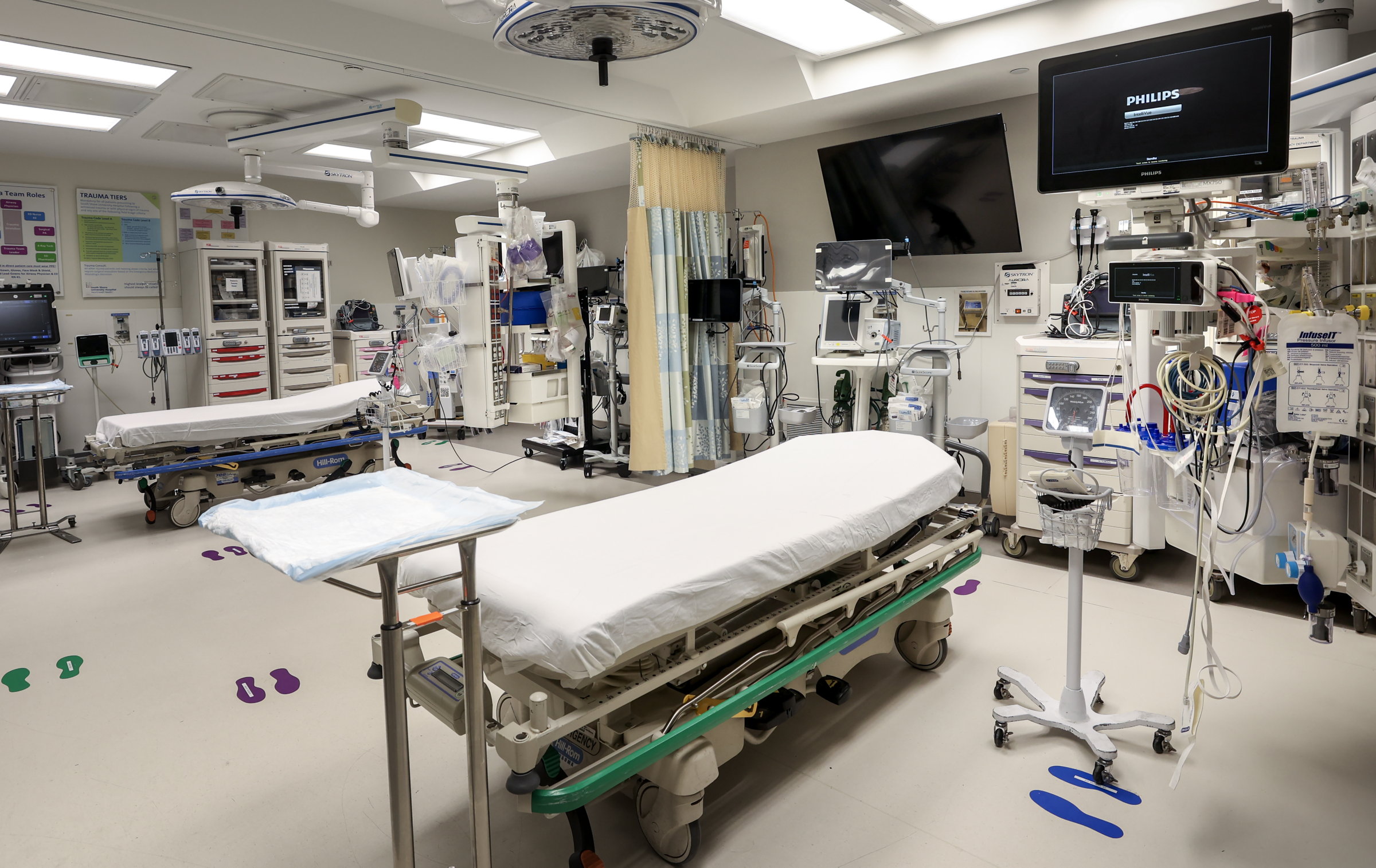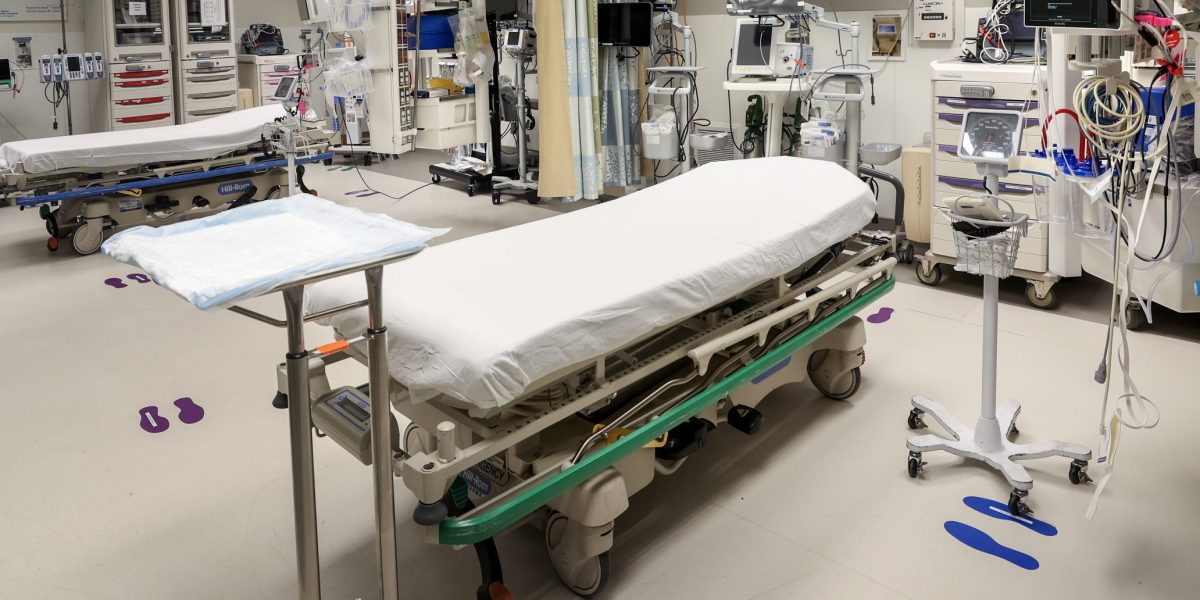
One of the trauma bays at South Shore University Hospital in Bay Shore, New York, on August 7, 2024. Photo: John Paraskevas/Newsday RM via Getty Images
Michael Kinnucan is the Senior Health Policy Advisor at the Fiscal Policy Institute.
One of the major policy ideas animating the One Big Beautiful Bill Act (OBBBA) was the notion that the federal government was wasting money providing Medicaid to healthy adults. OBBBA addressed this supposed problem by instituting work requirements for non-disabled adult Medicaid enrollees – a red tape obstacle course that will cause an estimated 10-15 million people to lose federal Medicaid coverage.
This will occur even though the vast majority of those who will become uninsured already satisfy the new work requirements. Most adult non-disabled adult Medicaid enrollees already work, but experience in states like Georgia shows that many will struggle to prove that fact to a government bureaucracy every six months.
In principle, state governments could step in to prevent this by covering those who lose federal Medicaid using state-only dollars. But even deep-blue New York, where I live, seems unwilling to do so: Governor Kathy Hochul has already announced that New York can’t afford to “backfill” federal cuts. So states are likely to attempt to save money by kicking people off Medicaid.
It won’t work – states can’t save money this way. The trouble with attempting to save money by denying people insurance is that some of the people involved are healthy, and don’t cost money, while others are sick, and will flood hospital emergency rooms if they don’t have insurance.
You can’t save money by denying healthy people healthcare, because healthy people aren’t the ones using healthcare.
You can’t save money by denying healthy people healthcare, because healthy people aren’t the ones using healthcare. That’s true in private insurance, where 80 percent of healthcare spending goes to the sickest 20 percent of the insured population. And it’s true in Medicaid, too: The vast majority of Medicaid spending goes to providing healthcare to sick people.
Merely enrolling someone in Medicaid, after all, costs almost nothing at all; you update the state database, you mail them a card, you’re all set. What costs money is providing healthcare when they get sick. Hospital visits, specialist treatment, chemo, prescription drugs – that’s where the money goes. It’s when someone gets hit by a bus, or gets a cancer diagnosis, or suffers from diabetes, that covering them on Medicaid begins to cost money.
Now, most of the people targeted by Trump’s work requirements are not currently sick, just as most people with private health insurance are not currently sick. But precisely because they’re not sick, they cost the Medicaid program virtually nothing – maybe a couple of hundred dollars a year for an annual checkup. You can’t save any meaningful amount of money by kicking them off the program.
If you want to save money, you need to deny healthcare to sick people. As politically unappealing as it may be to deny insulin to diabetics, or to refuse chemotherapy to cancer patients, it’s really the only option to achieve savings. Remember that rule of thumb about how 80 percent of the money goes to treat the sickest 20 percent of enrollees; if policymakers want to achieve savings, they need to be laser-focused on not paying for healthcare for those sickest 20 percent.
And policymakers could certainly pursue that option! There is a foolproof way to save money on Medicaid, which is to let sick people who are kicked off Medicaid simply die in the street. When a guy rolls into the ER on a gurney after a traffic accident, we as a society could shrug and say “he didn’t properly fill in the paperwork to show his employment status back in March, so he’s out of luck,” and let him bleed out. We’d have saved perhaps hundreds of thousands of dollars in ICU costs at a single stroke.
We’re independent of corporate interests — and powered by members. Join us.
Join Our Newsletter
Thank You For Joining!
Original reporting. Fearless journalism. Delivered to you.
Will you take the next step to support our independent journalism by becoming a member of The Intercept?
By signing up, I agree to receive emails from The Intercept and to the Privacy Policy and Terms of Use.
But there are substantial practical problems with this approach to saving money on Medicaid, which are that (1) it’s morally reprehensible, (2) it’s politically toxic, and (3) it violates long-established state and federal law regarding hospitals’ obligation to provide emergency care.
Because of these practical obstacles, politicians have hunted for other approaches to disguise what they’re doing. They require hospitals to treat uninsured people in emergencies, and provide billions in state and federal funding to compensate them for that care. They pass laws like the Big Beautiful Bill Act that kick millions off Medicaid, but add carveouts for those with “serious or complex” medical conditions. And then they tell the public “well, we’ll cut off Medicaid, but only to healthy people.” We’re going to achieve some Medicaid savings, yes, but we’re not monsters; we won’t let people die in the street.
But there’s just no way to do this. The money goes to pay for healthcare for sick people. Either we won’t provide it, and we’ll achieve savings (but they’ll die), or we will provide it, and we won’t achieve savings (but they’ll live).
So which will it be?
Under the new regime post-OBBBA, we’ll no doubt see a little of both. Some people will certainly die because they’re kicked off Medicaid. Many others will get care despite being uninsured – once they get seriously ill, they’ll end up in the ER and be legally entitled to treatment, or their illness will qualify them for a disability or “medically fragile” exemption from work requirements, and they’ll get back on Medicaid. In either case, state governments will ultimately pay for their care.
In these cases, our political system will have succeeded in generating the stupidest possible outcome: Keeping people off Medicaid until they get sick. We’ll be forcing people to endure a stressful bureaucratic nightmare, encouraging them to skip primary care, skimping on chronic disease management for diabetic and asthmatic patients, and all for naught: We still pay for their care. We may well pay more for their care as unnecessary hospitalizations increase.
Which is all to say that while the idea of saving money by denying healthcare to healthy people may be politically appealing, it’s a will o’ the wisp. If you want to save money you have to let sick people die – and if that’s what you want to do, say it clearly. If you want to make sure sick people don’t die, then you’re going to pay for it, one way or the other – so you might as well keep people insured.

